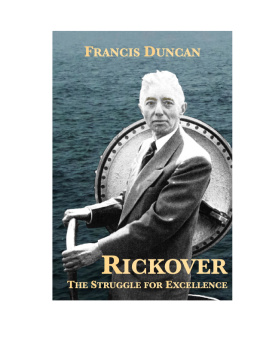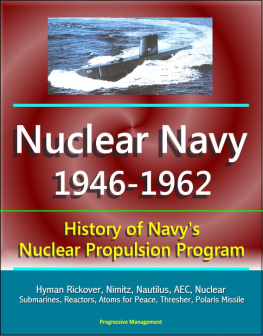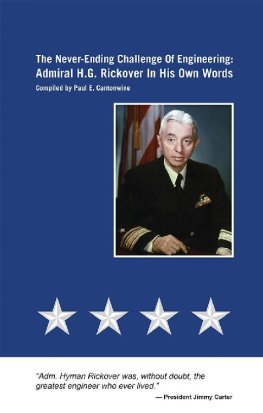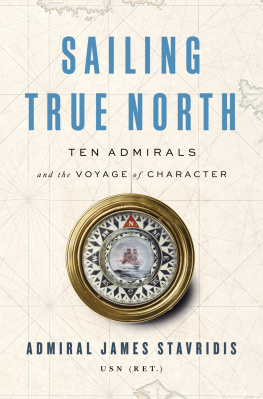Rickover
The Struggle for Excellence
by Francis Duncan
Published by Plunkett Lake Press , June 2021
2001 by Francis Duncan
Cover by Susan Erony
~ Other eBooks from Plunkett Lake Press ~
By Finn Aaserud
Redirecting Science: Niels Bohr, Philanthropy, and the Rise of Nuclear Physics
By Yigal Allon
Shield of David: The Story of Israel s Armed Forces
By Luis W. Alvarez
Alvarez: Adventures of a Physicist
By Niels Blaedel
Harmony and Unity: The Life of Niels Bohr
By Omar Bradley and Clay Blair
A General s Life: An Autobiography
By Andrew Brown
The Neutron and the Bomb: A Biography of Sir James Chadwick
By David C. Cassidy
J. Robert Oppenheimer and the American Century
By Herbert Childs
An American Genius: The Life of Ernest Orlando Lawrence, Father of the Cyclotron
By Arthur Holly Compton
Atomic Quest
By Samuel Goudsmit
Alsos
By James Hershberg
James B. Conant: Harvard to Hiroshima and the Making of the Nuclear Age
By Godfrey Hodgson
The Colonel: The Life and Wars of Henry Stimson, 1867-1950
By George F. Kennan
Memoirs 1925-1950
Memoirs 1950-1963
Russia and the West Under Lenin and Stalin
By Harold Larrabee
Decision at the Chesapeake
By Melvyn Leffler
A Preponderance of Power: National Security, the Truman Administration, and the Cold War
By Netanel Lorch
The Edge of the Sword: Israel s War of Independence, 1947-1949
By Norman Macrae
John von Neumann: The Scientific Genius Who Pioneered the Modern Computer, Game Theory, Nuclear Deterrence, and Much More
By Steven Neuse
David E. Lilienthal: The Journey of an American Liberal
By John Kennedy Ohl
Supplying the Troops: General Somervell and American Logistics in World War II
By Richard Overy
The Air War, 1939-1945
By Forrest C. Pogue
George C. Marshall: Education of a General, 1880-1939
George C. Marshall: Ordeal and Hope, 1939-1942
George C. Marshall: Organizer of Victory, 1943-1945
George C. Marshall: Statesman, 1945-1959
By Patricia Rife
Lise Meitner and the Dawn of the Nuclear Age
By John Rigden
Rabi: Scientist and Citizen
By Emilio Segr
A Mind Always in Motion : The Autobiography of Emilio Segr
Enrico Fermi, Physicist
By Russell F. Weigley
Eisenhower s Lieutenants: The Campaign of France and Germany, 1944-1945
By George Wise
Willis R. Whitney, General Electric, and the Origins of U.S. Industrial Research
For more information, visit https://plunkettlakepress.com
For Frances forever
Contents
Foreword
In 1954, as a newly commissioned ensign in the Navy Nurse Corps, I was under indoctrination into the Navy at St. Albans Naval Hospital on Long Island, New York. On a free weekend I traveled by train with a friend in order to tour Washington, D.C. While on the bus tour we passed the U.S. National Naval Medical Center in Bethesda, Maryland. I vividly recall telling my friend that I hoped I never would receive orders there since I did not want to be around all that brass. Little did I know what the future held in store.
I was delighted when my orders to report to the U.S. Naval Hospital, Oakland, California, arrived. At my third duty station I was one of four nurses at the U.S. Naval Ammunition Depot in Hawthorne, Nevada. Since it was considered an isolated area, we were led to believe that we would choose our next assignment. I requested the Naval Hospital in Bremerton, Washington, or any place on the West Coast. I was disappointed when I received orders directing me to report to the U.S. National Naval Medical Center in Bethesda, Maryland. I thought perhaps they had confused Bremerton with Bethesda. After some consideration I decided to comply with the orders since I had enjoyed all my previous duty stations. I was a Reserve officer, so if I disliked duty in Bethesda, I was not obligated to remain in the Navy.
After about a year and a half at Bethesda, I was assigned to Tower 16, where the patients were all VIPs admirals, senators, congressmen, foreign diplomats but I was reluctant to go because I had enjoyed the positive and professional working relationship we had developed with our medical officer and Hospital Corpsmen. Nevertheless, as a young lieutenant relieving a commander, I had no choice but to accept the assignment.
On the day I reported for duty on Tower 16, Vice Adm. Hyman G. Rickover was admitted to my floor. He did not arrive until my shift was over, so I met him for the first time the following morning. The duration of his hospital stay was twelve weeks, followed by frequent appointments with his doctor, whose office was on Tower 16. During that time I was privileged to get to know Admiral Rickover to some extent. Later, as I furthered my education, he became my friend and my mentor.
In January 1974, Admiral and I were married. I was still a commander on active duty at Great Lakes Naval Hospital in Waukegan; he had been promoted to four-star admiral a month earlier. So much for not wanting to be around all that brass. However, Admiral Rickover was not a typical admiral. He did not wear his uniform, had no military aide, and worked in frugal surroundings.
Admiral and I were sent orders from the secretary of the Navy, who at that time was John Warner, to attend the dedication of Rickover Hall, the engineering building at the Naval Academy, and it specifically stated we were to wear our uniforms. We did. The day of my retirement from the Navy, Admiral appeared in my office wearing his uniform. I was quite surprised and pleased at the same time. He said, I thought you would like it.
Shortly after we were married, I found a quotation from an ancient Sanskrit text that I thought described my husband very well, and I would like to share it with you: Softer than the flowers where kindness is concerned / Louder than the thunder where principles are at stake. Those who knew my husband well could relate to the first part; however, most of the men told me they were more familiar with the latter. He was a very sensitive, caring, kind, funny, and principled man.
I would like to leave the reader with a paragraph from the last letter I received from my husband while at sea on 24 January 1982. Knowing that his retirement would take place on 30 January, he was thinking about his life in a philosophical way: As I have amply known in the course of a long life success in one s work is not and never has been the major object of my life. It seems to have come naturally to me to work hard and to complete whatever work I have undertaken. This feeling and attitude of full personal responsibility is what has made it possible for me to accomplish every working duty I have ever been assigned and to improve the previous status of the work.
Admiral Rickover was most grateful to this country for the opportunity that made it possible for him to do what he wanted to do. He knew that had his parents not emigrated to the United States, he would have become a victim of the Holocaust. Years later he learned that no one from his home town in Makow, Poland, had survived.
In this well-written, factual, and readable book, Francis Duncan tells the story, in as concise a manner as possible, of a complex man who dedicated his life to his country for sixty-three years while demonstrating that through discipline, determination, and hard work, great accomplishments are possible.
I enjoyed reading Rickover: The Struggle for Excellence, and I hope you will too.
Eleonore Bednowicz Rickover
Preface
The origins of this biography go back to 1969, when Adm. Hyman G. Rickover requested that the Atomic Energy Commission assign its chief historian, Richard G. Hewlett, and me to his office to write historical studies of the joint Atomic Energy Commission-Department of the Navy naval nuclear propulsion program. As a result, we wrote Nuclear Navy, 1946-1962, published by the University of Chicago Press in 1974. Afterward, Hewlett returned to his task of writing the history of the commission, but I continued in Admiral Rickover s office, where I wrote Rickover and the Nuclear Navy: The Discipline of Technology, published by the Naval Institute Press in 1990. The purpose of the book was to show how the admiral ran a technical program that had gained worldwide recognition for its excellence.
Next page







